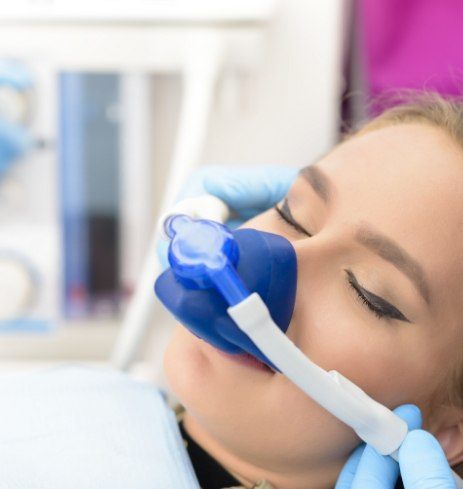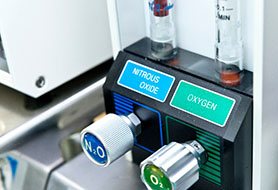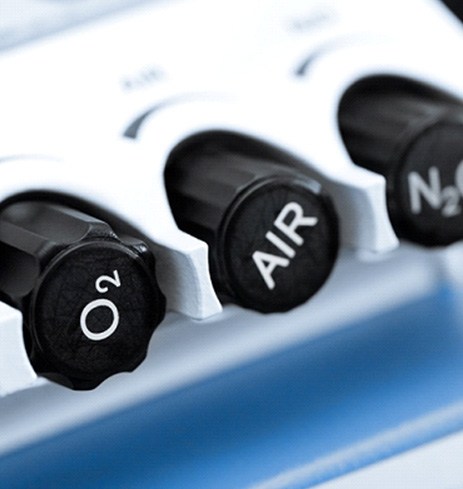Sedation Dentistry Dumfries
Getting Rid of Dental Fears and Anxieties
We understand that some patients are nervous or anxious when it comes to oral or facial surgery of any kind. One of our goals during your visit will be to help you relax as much as possible, and to this end we have three dental sedation options for you to choose from. Before your procedure, Dr. Shinwari will discuss these options, including sedation dentistry in our Dumfries oral surgery office, in order to help you figure out which one is the best choice for keeping you comfortable in mind and body during your treatment.
Why Choose Oral & Facial Surgery Center of Virginia for Sedation Dentistry?
- Multiple Sedation Options in One Location
- Welcoming, Comfortable Oral Surgery
- Focus on Exceptional Patient Experience
Nitrous Oxide Sedation

You may know nitrous oxide by its more common name, “laughing gas.” Oral health professionals have been using this sedative to help patients stay calm and relaxed for years. There are a few reasons for this, including that it’s fast-acting, safe for patients of all ages, and effective. If you’re interested in learning more about this mild sedative or want to find out if you’re a good candidate, then don’t hesitate to schedule an appointment with our team or read on.
Who Is a Good Candidate for Nitrous Oxide?

During your first appointment with our Dumfries oral surgeon, Dr. Shinwari, he will learn about your dental needs, review which treatment option(s) he recommends, and create your custom treatment plan. If you’ve struggled with dental anxiety in the past or have a particularly lengthy treatment, then nitrous oxide may be a great solution for you. However, it’s also beneficial for patients who have a sensitive gag reflex, have trouble controlling their movements, or suffer from dental sensitivity.
Note: Although nitrous oxide is safe, there are certain conditions that would prevent someone from being a good candidate. Patients who are expecting or have a breathing disorder are a few examples. That’s why we will ask questions about your medical history, any medications you’re taking, and any allergies you have during your initial visit with us.
How Does Nitrous Oxide Work?

One of the biggest perks of nitrous oxide is that it only takes a few minutes for the effects to begin to set in. First, we will place a nasal mask over your nose. Then, we will switch on the nitrous oxide, so you can breathe in the odorless gas. Shortly after, you’ll enter a highly relaxed and euphoric state, which you’ll stay in for your entire appointment. Although you won’t be asleep, you may feel so calm that you doze off. That’s okay – we can always wake you if you do.
Aftercare for Nitrous Oxide

Once your treatment is complete, we will switch the nitrous oxide off, and the gas’s effects will wear off almost instantly. As a result, you can go back to your day like you normally would! This is extremely helpful for patients who need a little extra help feeling calm in the treatment chair but need to get back to work or school shortly after.
Although there aren’t any specific recommendations related to nitrous oxide, we will provide you with post-op instructions for dental implants, wisdom teeth extractions, or whatever treatment you did receive. That way, you can have the smooth and comfortable healing process you deserve.
General Anesthesia
Some types of oral surgery are best performed while the patient is asleep. This is done through general anesthesia, which involves a combination of medications that make the patient completely unconscious for the duration of their treatment. Your brain won’t respond to pain signals or reflexes, meaning you’ll be in complete comfort for the duration of your visit. We’ll keep a close eye on your body’s breathing and vital functions, so you’ll be safe the entire time you’re under general anesthesia.
IV Sedation

IV sedation is generally reserved for patients who are either suffering from severe fear or anxiety before their appointment or those that are having more extensive work done. The sedative is injected into your arm, and it can be adjusted as needed in real time. Unlike general anesthesia, IV sedation doesn’t make you unconscious; it simply puts you in a powerful state of relaxation where you won’t be bothered by anything happening around you. Most people who have IV sedation have little to no memory of the procedure afterwards.
What Is IV Sedation?

IV sedation is a fast-acting form of sedation that’s administered through an IV that guides the medication directly into the bloodstream. The effects occur nearly immediately, and while you’ll remain conscious throughout the process, it’s not likely that you’ll remember any part of your treatment afterward. You’ll still remain conscious, so long as you don’t fall asleep, and one of our trained staff members will monitor your vitals throughout your entire treatment.
Due to the strength of the sedation and because the effects can take up to 24 hours to completely go away, you’ll need to be prepared to have a trusted friend or family member pick you up from our office.
Who Is a Good Candidate for IV Sedation?

We typically recommend IV sedation for patients who are undergoing more invasive procedures, like dental implant placement, wisdom tooth extractions, or those who have chronic conditions that may make it difficult to keep their mouth open for long periods of time.
Before we administer the medication, we’ll be sure to go over your medical and dental history, any medications you’re taking, and answer any questions you may have during a consultation. We’ll then walk you through what you can expect before and after the process so you feel comfortable moving forward with your surgery.
The Benefits of IV Sedation

IV sedation offers several benefits to our patients. Here are some advantages you’ll be able to receive:
- Effects that kick-in nearly immediately because the medication is administered directly into the bloodstream.
- Peace of mind that your vitals will be monitored by a professional throughout your entire treatment.
- The dental team will be able to adjust your medication flow based on the effects you’re experiencing, leading to a reliable state of relaxation.
- You won’t be able to remember most of your treatment afterward.
Sedation Dentistry FAQs

Sedatives can make a dramatic difference in how people experience dentistry, especially people who typically have issues with dental anxiety. However, if you’re interested in pursuing the treatment, you may have questions about what sedation entails.
We’ll be happy to talk to you when we meet you in person about the varieties of sedatives we have available and how each of them is used, but if you want to learn a bit more about it before that, here are some answers to common questions we get about sedation.
How Long Do Dental Sedatives Last?
While every dental sedative can easily last for the duration of a procedure, some of them have a little bit of a “hangover” that can make you feel a bit groggy after the treatment has been completed. It really depends on which kind of sedation you get.
Nitrous oxide, being the mildest sedative, will wear off almost completely within a few minutes of the flow of gas stopping. IV sedation and general anesthesia, on the other hand, will leave you feeling a bit tired for several hours, meaning that you should plan to have someone drive you home after your procedure.
Do Dental Sedatives Make You Tell Secrets?
You may have seen some of the viral videos floating around that feature patients under the influence of sedatives saying things that they ordinarily wouldn’t, or even revealing secrets. The fact is that many of the most extreme videos you’ll watch are staged—dental sedatives aren’t truth serums, and while you may act a little loopy, you’re unlikely to divulge any dark secrets.
Frankly, we’ve been doing this long enough to have heard everything from sedated patients, and we aren’t interested in getting you to say anything you wouldn’t want to. And no matter what you say, you can rest assured that it’ll stay within the walls of our office.
Am I a Good Candidate for Sedation Dentistry?
If you’re normally too anxious to get regular dental care, sedation dentistry can help to keep you relaxed for the duration of your procedure. However, anxious patients aren’t the only ones who can benefit—if you have a strong gag reflex, or if you’re someone who has trouble sitting still for the duration of the procedure, sedatives can put you more at ease.
There are also some patients who aren’t well-suited to sedatives. If you’re pregnant or are taking certain contraindicated medications, we may hold off on any dental treatments that would require sedation until the situation changes. We’ll talk with you about your medical history to ensure that you’re ready for sedatives.
Do Dental Sedatives Put You to Sleep?
With the exception of general anesthesia, we don’t really want our patients to fall asleep during a procedure. Ideally, we want you to be able to follow our instructions, so most of the sedatives that we use are designed to keep patients conscious for the duration of treatment.
However, it’s common for people’s memories to be a bit fuzzy after the procedure, meaning that it may feel like you’ve fallen asleep, even if you haven’t. It’s also common for patients to doze off while under the influence of sedatives, though the sedative itself won’t necessarily knock you out.
Is Sedation Dentistry Covered by Insurance?
Oftentimes, sedation dentistry is classified as a “luxury” treatment, and, therefore, is not covered by dental insurance providers. With that said, there are some exceptions. For instance, a portion of the cost is often covered if the patient has a disability, like cerebral palsy, that makes it virtually impossible to get the dental care they need without it. So, don’t hesitate to read through the fine print on your plan.
If you need any help understanding your benefits, you’re more than welcome to provide our team with your membership information as well! We’re proud to work with several popular providers, including Delta Dental, and we would be happy to review your coverage and share what is and isn’t covered.
Is Sedation Dentistry Worth It?
If you find out that you’ll need to pay for the cost of emergency dentistry completely out-of-pocket, you might be wondering if sedation dentistry is really worth it. While that’s ultimately up to you, the answer is a resounding “yes” for the vast majority of patients. After all, not only do calming solutions like nitrous oxide alleviate anxiety, stress, and worry, but they also allow our oral surgeon to get more work done in a single sitting.
Can Dental Sedation Make You Sick?
It’s quite rare to experience nausea with nitrous oxide since it’s so mild. There is, however, a higher risk with stronger forms of dental sedation, like IV sedation and general anesthesia. For that reason, patients are usually asked to fast prior to their appointment. If you’re already prone to feeling nauseous, then we may give you an anti-nausea drug as well.

